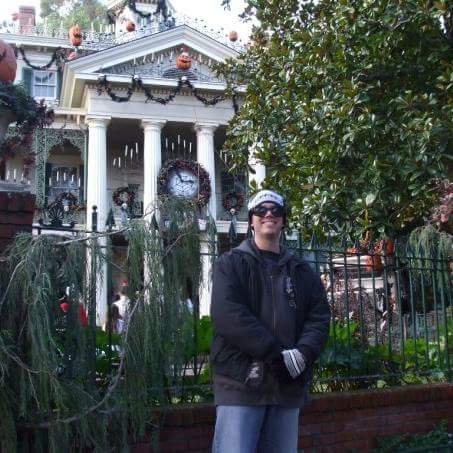 myCSUSM
myCSUSMFaculty Highlights
Brandon Reynolds
November 2015

This month, our faculty highlight is Brandon Reyonlds, who was interviewed by Melanie James.
So Brandon, tell me a bit about your background and why you became a writing instructor.
Well, I’ve always loved writing, and I’ve been writing stories since I was old enough to pick up a pencil. With teaching, I think I got bitten by that bug around 2002; I started out as a music student, but then I figured out that music is all math. As much as I still love music and even incorporate it into my classes, I couldn’t teach music theory. So I changed majors and went to literature. That’s when I decided what I wanted to be. I did my undergrad and Master’s here [at CSUSM] too. I’ve been here about ten years.
Clearly you love writing and it has always been a part of your life, so what were you like as a student writer?
I still am very much like I was as a student writer—I write primarily horror stories. As a student writer I always had a lot to say but was always a brutal self-editor—I am ruthless at self-editing.
Did you find that the relentless self-editing inhibited your writing process a bit?
Yes, and I tell my students that: I have a five page paper due, and it comes out to ten, and that’s not a big deal. I can cut that later. It’s really important not to disrupt the process of writing a paragraph by deleting it all right away because that gets frustrating. It loses that appeal of “I’m creating something.” And to me, that’s a part of the process—fiction, non-fiction—you’re creating something.
I know from around the water cooler and from student discussion that the theme of your composition class is monsters. Why monsters?
Aside from the fact that I love horror, monsters are a couple of things: they are cross-cultural and they are timeless. Every culture has one, whether it is an actual monster (like a dictator) or folklore. It’s one thing that in a weird way brings everyone together. By taking these monsters out of the dark, we can learn a lot about ourselves: how we should behave or shouldn’t behave, or lessons that ask us questions like how much knowledge is too much? There’s a distinct societal message there. The monsters themselves may not be moral, but they stand for a morality that is interesting—and that’s what we tend to explore when we’re writing about them in class: constructions of gender, sexuality, race, power dynamics, and so on.
So you’re really able to examine the human condition by examining monsters?
Yes, a lot of social issues come with it. Our first paper was on zombies and how they make arguments on social issues like race and consumerism.
You’ve mentioned your first essay, but what’s your favorite GEW assignment or essay to teach?
Well I have two. I like the textual analysis of Frankenstein because I’m a literature major at heart. I love interpreting and analyzing literature, and I love teaching my students how to do that. I also like teaching the last research paper, because I like to see what they come up with.
What are the guidelines for that last paper?
Usually they have two options: take a monster of their choice and argue if they deserve basic human rights or not. The second one is how a chosen monster or monsters help us cope with the fear of death.
That sounds like so much fun. Now that we have an idea of what your classroom looks like, what about outside the classroom? We’ve talked a lot about your intellectual and academic interests, but what else is there to “Brandon”?
I’m an avid music fan. I write. I try to write every day. Actually, I’m usually here by seven in the morning sequestered in the office working on some of my personal writing unless I’m grading. I play video games. I spend a lot of time with my wife. I play Dungeon and Dragons on the weekends, and I go to as many rock concerts as I can.
Last rock concert you went to?
Marilyn Manson and the Smashing Pumpkins.
How was it?
It was really, really good. And I’m excited because I just got Black Sabbath tickets
for February.
Awesome! Okay, one last question. And it’s the most important question of the interview: what’s your favorite monster and why?
Anything from H.P. Lovecraft is going to be my favorite. I did my Master’s thesis on H.P. Lovecraft. All the Lovecraftian horrors have a similar message: monsters were here before us, we are stupid enough to worship them as gods, they’re really not, and so on. But my favorite specific monster is probably Carmilla [from the nineteenth-century gothic novella Carmilla by Joseph Sheridan Le Franu]; it’s a vampire story that predates Dracula by about thirty years. I like strong female characters, and Carmilla goes beyond the archetypal female seductress vampire: she’s strong, she’s terrifying, but she’s elegant at the same time. When we discuss the pitfalls of gender and monstrosity in class, I always bring her up as an example.
Thank you, Brandon!
No problem!






